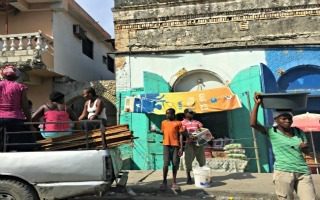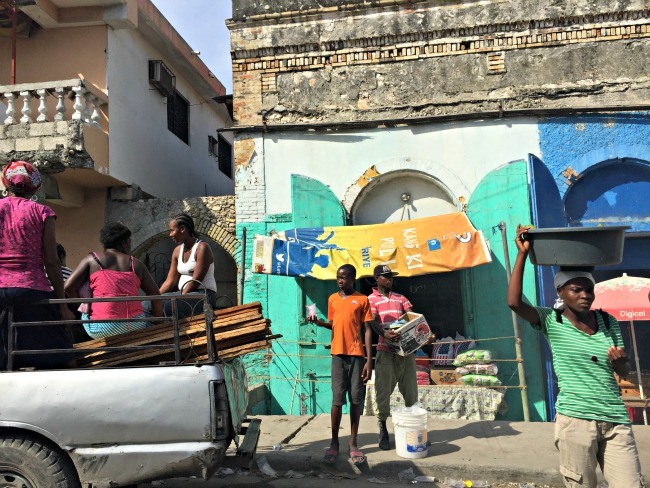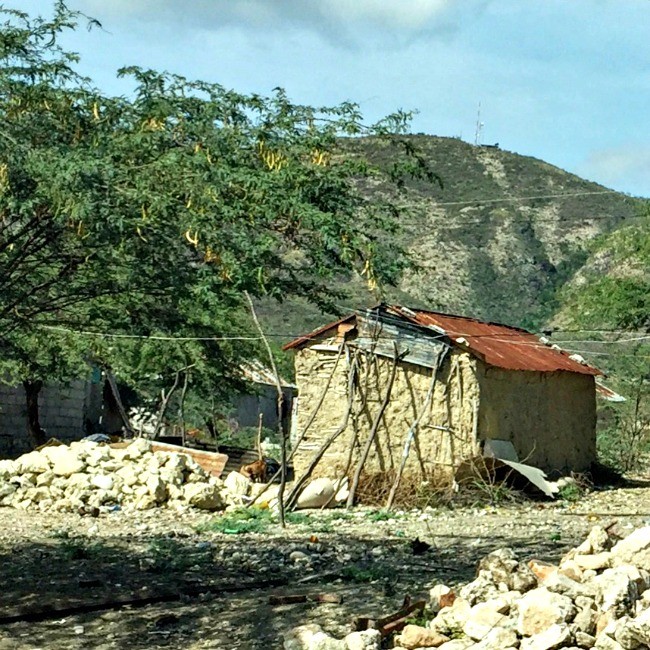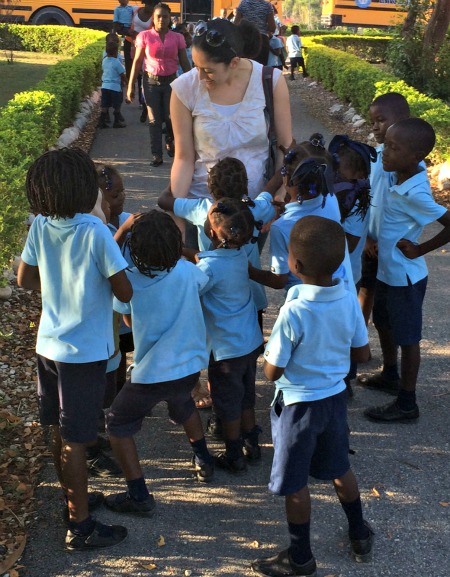As I was preparing for my trip I had some perceptions of what I’d see in Haiti.
From the moment I stepped off the plane I knew was in for an experience that would leave a lasting impact on me.
After spending a few days in Haiti as part of a group of teachers working in partnership with a privately funded school there, I wanted to reflect on the experience. An understatement indeed, but Haiti is not the typical Caribbean destination of choice, but rather, the poorest nation in the Western Hemisphere.

I was certainly aware to some degree of what I’d be seeing. I’ve traveled to parts of Southeast Asia like Thailand & Cambodia and Central and South America, where the living conditions are less than optimal.
However, from my first steps out of the Port au Prince Airport, nothing quite readied me for the divide between the world I’d come from and the one in which I’d arrived.
Port au Prince is nothing like the photos of Haiti’s beaches at Labadee or the UNESCO World Heritage Citadel and Palace near Cap Haitïen. The city streets are chaotic, lined with trash, and can seem lawless.
4 Impactful Take-Aways from my Visit to Haiti
As I considered my thoughts and feelings about my time in Haiti, it felt phony to rattle on about realizations of how “rich” I am compared to the people whose lives I glimpsed or how grateful I am for things like safety, freedom, and privilege.
I’ve lived and traveled enough to recognize already how fortunate I am to have these things. My gratitude is ever-present and I didn’t want the sum of my reflections about Haiti to be about my own personal growth.
It’s only natural my mind was consumed with all kinds of thoughts as I took in the scenes of daily life around me, but with time to sort through my experiences, I’d like to share with you 4 impactful takeaways from my visit to Haiti.
1. It can be shocking to see firsthand how a country with a broken government looks.
Government is supposed to protect and provide secure access to people’s basic needs.
Yet, after just a short time in Haiti, you quickly understand what a privilege this is. When decades of corrupt leaders steal hundreds of millions of dollars from their people, the result can only be utter devastation in the places where government programs and infrastructure should be.
Roughly 60% of people in Haiti are living below the international poverty line of less than $1.25 per day(!!!) and the government is unable to offer widespread assistance.
Extreme poverty shows itself in the tattered clothing worn by children, the houses made of mud, straw, and scrap metal roofs, and the despondent looks clouding the faces of many as they stare from their homes and go about the day.
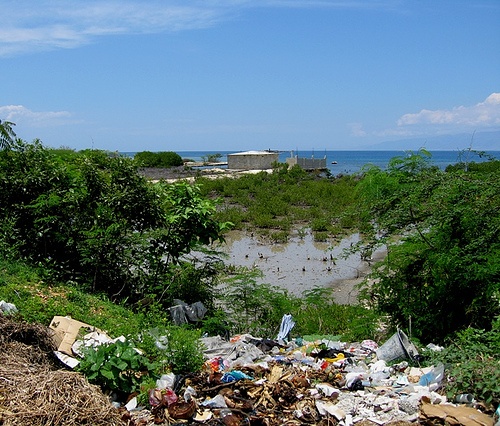

Garbage is everywhere. Piles of it are strewn along the streets, outside of houses, and filling communities and cities. In the seemingly lawless capital city of Port au Prince, heaps of garbage burned unattended along the roadside.
I felt both admiration and heartbreak watching a boy pull a string attached to a toy car he had made from a plastic water bottle and other garbage remnants.

Water is a basic need, and yet over 40% of people in Haiti don’t have access to drinkable water and nearly 80% of people don’t have access to a sanitary toilet.
At the school where I worked, signs warned in Haitian Creole, French, and English to use the chlorine-treated water to wash your hands in order to prevent the spread of Cholera and other diseases.
When the children arrived at school each day, the first order of business was not math or reading, but rather going to the bathroom, washing their hands, and eating the hot breakfast awaiting them.
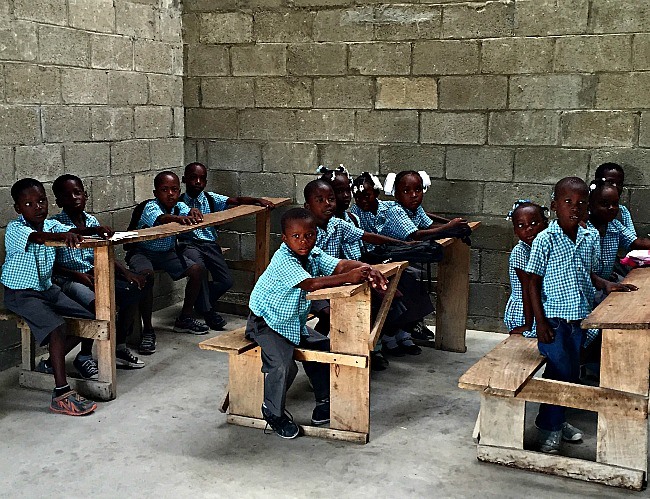
Even though it should be a basic human right, the Haitian government is unable to provide free public education to all. With only 3%-10% of the federal government’s budget allocated for education, the burden of tuition and school uniform fees falls on families who struggle to pay or simply cannot afford it.
Private funding and charity groups have helped in boosting the percentage of primary age kids attending school to near 75%, but this falls sharply with just 20-25% of children continuing on to High School.
Teachers are largely untrained and more than a third of Haitians are illiterate.
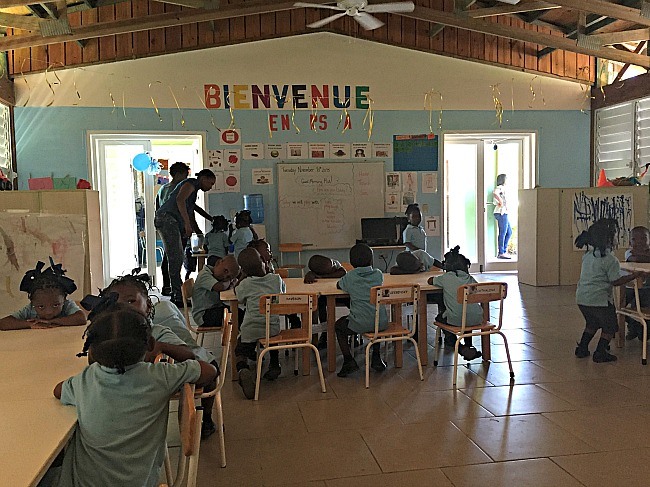
The electric utility is nearly nonexistent in Haiti with only around 12.5% of people having regular, legal access to electricity. No electricity goes beyond just pitch black streets and boredom.
After dark, people can’t read or otherwise educate themselves. Hospitals may not have the necessary treatments that require refrigeration. With only their immediate surroundings at their disposal, children can’t benefit from the broader exposure things like the internet, movies, and even TV can provide.

Looking at a night view of the island, Haiti is on the left and the Dominican Republic is on the right. Other than Port au Prince on the Haiti side, few lights can be seen.
2. It’s vital to be in the moment, especially when something is uncomfortable.
Slipping through the ramshackle stone and metal wall to enter the Pont Leocan community, just across from the private school gates, I was momentarily disoriented.
Amidst the dry, rocky landscape are tiny houses made from scrap metal, plastic tarps, and a mortar-like mixture of mud and straw, as well as a few people with houses made of cinder blocks.
There is no water. There is no electricity. No one has shoes. The children wear a top or a bottom. The conditions immediately teach the difference between poor and poverty.
I tell myself to refocus.
See the old woman who’s smiling her friendly, toothless grin and wrapping her arms around you. Engage with the excited children who are (literally) hanging off of you and want you to jump and play with them.
Make eye contact and think only of this moment and then the next. These are people who are both happy and curious to see you. These are some of the most precious moments from my time in Haiti.
3. It’s flattering to stand out because of how you look every once in a while, but distressing if it’s your daily experience.
Not only did I look different to the children living in Pont Leocan, I was a total sideshow.
Those who were more outgoing crowded around to hold my hand, touch my clothes, even feel my cheeks, and tug at my hair.
Other children were interested in who I was, but cautiously kept their distance, used a stick to touch the backs of my legs, or waited to finally build up the courage before touching my skin. One small baby being held by her mother screamed any time her mom leaned her toward me.


It makes sense that some of the not yet school-aged children hadn’t seen many (if any) people with a skin color as light as mine.
But, how would it feel day after day to be on display because of a physical attribute or an appearance that’s different from everyone else around you?
Even though it’s easy to say we can imagine how that would feel, it resonates differently when you’re actually in an experience where you are the exhibit.
4. Human beings have incredible strength and resolve.
The children at school wanted to play.
They sought out the teachers’ attention. There were children who helped their friends on a class project and others who cut the line or tattled on someone else. They enjoyed music, storytelling, and recess. It was easy to get caught up in the day and for a moment forget what was beyond the school gates because these kids were just being kids.
Riding the school bus in the early morning hours into Saint-Marc, a woman sat on her front porch combing her daughter’s hair. The crowded streets were busy with honking motorbikes and people interacting and trying to sell their goods.
All across the island of Haiti, there’s so much more than what meets the eye.
Daily life keeps moving and the people I saw displayed an incredible will to continue on even in the face of the direst circumstances imaginable. It’s impossible to not come away feeling awed at such resilience.
What do you think of these takeaways? Have you visited a developing country? What were your takeaways?
Like this post? I’d love for you to share it with your social media followers using the share buttons below!

